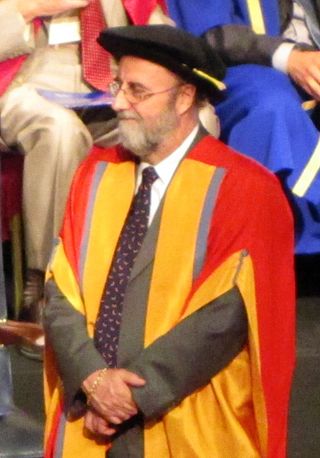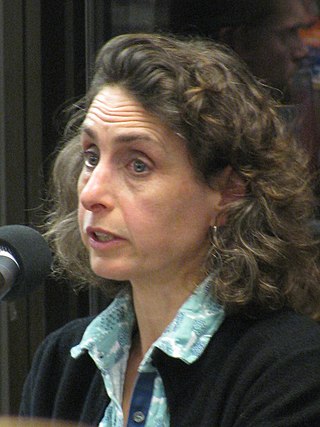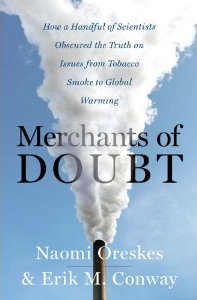Environmental skepticism is the belief that statements by environmentalists, and the environmental scientists who support them, are false or exaggerated. The term is also applied to those who are critical of environmentalism in general. It can additionally be defined as doubt about the authenticity or severity of environmental degradation. Environmental skepticism is closely linked with anti-environmentalism and climate change denial. Environmental skepticism can also be the result of cultural and lived experiences.

Siegfried Fred Singer was an Austrian-born American physicist and emeritus professor of environmental science at the University of Virginia, trained as an atmospheric physicist. He was known for rejecting the scientific consensus on several issues, including climate change, the connection between UV-B exposure and melanoma rates, stratospheric ozone loss being caused by chlorofluoro compounds, often used as refrigerants, and the health risks of passive smoking.

The global warming controversy concerns the public debate over whether global warming is occurring, how much has occurred in modern times, what has caused it, what its effects will be, whether any action can or should be taken to curb it, and if so what that action should be. In the scientific literature, there is a very strong consensus that global surface temperatures have increased in recent decades and that the trend is caused by human-induced emissions of greenhouse gases. No scientific body of national or international standing disagrees with this view, though a few organizations with members in extractive industries hold non-committal positions, and some have tried to persuade the public that climate change is not happening, or if the climate is changing it is not because of human influence, attempting to sow doubt in the scientific consensus.

Sir Robert Tony Watson CMG FRS is a British chemist who has worked on atmospheric science issues including ozone depletion, global warming and paleoclimatology since the 1980s. Most recently, he is lead author of the February 2021 U.N. report Making Peace with Nature.

The George C. Marshall Institute (GMI) was a nonprofit conservative think tank in the United States. It was established in 1984 with a focus on science and public policy issues and had an initial focus in defense policy. Starting in the late 1980s, the institute advocated for views in line with environmental skepticism, most notably climate change denial. The think tank received extensive financial support from the fossil fuel industry.
The Scientific Alliance is a UK-based organization that claims to promote open-minded debate on scientific matters and science policy, including biotechnology, genetically modified food, energy and climate change. Its stated aim is to "bring together both scientists and non-scientists committed to rational discussion and debate on the challenges facing the environment today." In the scientific literature it is regarded as "a UK-based lobby group which challenges the scientific consensus on climate change".
Myron Ebell is an American climate change denier who serves as the Director of Global Warming and International Environmental Policy at the Competitive Enterprise Institute (CEI), an American libertarian advocacy group based in Washington, D.C. He is also chairman of the Cooler Heads Coalition, a politically conservative group formed in 1997 focused on "dispelling the myths of global warming by exposing flawed economic, scientific, and risk analysis". In September 2016, Ebell was appointed by then Republican presidential candidate Donald Trump to lead his transition team for the United States Environmental Protection Agency (EPA).
Philip A. Cooney is a former member of the administration of United States President George W. Bush. Before being appointed to chair the Council on Environmental Quality, he was a lawyer and lobbyist for the American Petroleum Institute. He was accused of doctoring and changing scientific reports about global warming by other agencies. He then resigned his position and denied any wrongdoing.

Naomi Oreskes is an American historian of science. She became Professor of the History of Science and Affiliated Professor of Earth and Planetary Sciences at Harvard University in 2013, after 15 years as Professor of History and Science Studies at the University of California, San Diego. She has worked on studies of geophysics, environmental issues such as global warming, and the history of science. In 2010, Oreskes co-authored Merchants of Doubt, which identified some parallels between the climate change debate and earlier public controversies, notably the tobacco industry's campaign to obscure the link between smoking and serious disease.

Elizabeth Kolbert is an American journalist, author, and visiting fellow at Williams College. She is best known for her Pulitzer Prize-winning book The Sixth Extinction: An Unnatural History, and as an observer and commentator on the environment for The New Yorker magazine. The Sixth Extinction was a New York Times bestseller and won the Los Angeles Times’ book prize for science and technology. Her book Under a White Sky was one of The Washington Post’s ten best books of 2021. Kolbert is a two-time National Magazine Award winner, and was awarded the BBVA Biophilia Award for Environmental Communication in 2022. Her work has appeared in The Best American Science and Nature Writing and The Best American Essays.

References to climate change in popular culture have existed since the late 20th century and increased in the 21st century. Climate change, its impacts, and related human-environment interactions have been featured in nonfiction books and documentaries, but also literature, film, music, television shows and video games.
Climate change conspiracy theories assert that the scientific consensus on global warming is based on conspiracies to produce manipulated data or suppress dissent. It is one of a number of tactics used in climate change denial to attempt to manufacture political and public controversy disputing this consensus. Conspiracy theorists typically allege that, through worldwide acts of professional and criminal misconduct, the science behind global warming and climate change has been invented or distorted for ideological or financial reasons.

Climate change denial or global warming denial is dismissal or unwarranted doubt that contradicts the scientific consensus on climate change. Those promoting denial commonly use rhetorical tactics to give the appearance of a scientific controversy where there is none. Many who are climate change deniers self-label themselves as "climate change skeptics", which is a misapplied description.

Merchants of Doubt: How a Handful of Scientists Obscured the Truth on Issues from Tobacco Smoke to Global Warming is a 2010 non-fiction book by American historians of science Naomi Oreskes and Erik M. Conway. It identifies parallels between the global warming controversy and earlier controversies over tobacco smoking, acid rain, DDT, and the hole in the ozone layer. Oreskes and Conway write that in each case "keeping the controversy alive" by spreading doubt and confusion after a scientific consensus had been reached was the basic strategy of those opposing action. In particular, they show that Fred Seitz, Fred Singer, and a few other contrarian scientists joined forces with conservative think tanks and private corporations to challenge the scientific consensus on many contemporary issues.

Media coverage of climate change has had effects on public opinion on climate change, as it conveys the scientific consensus on climate change that the global temperature has increased in recent decades and that the trend is caused by human-induced emissions of greenhouse gases.

The Sixth Extinction: An Unnatural History is a 2014 non-fiction book written by Elizabeth Kolbert and published by Henry Holt and Company. The book argues that the Earth is in the midst of a modern, man-made, sixth extinction. In the book, Kolbert chronicles previous mass extinction events, and compares them to the accelerated, widespread extinctions during our present time. She also describes specific species extinguished by humans, as well as the ecologies surrounding prehistoric and near-present extinction events. The author received the Pulitzer Prize for General Non-Fiction for the book in 2015.

As the world's largest majority investor-owned oil and gas corporation, ExxonMobil has received significant amounts of controversy and criticism, mostly due to its activities which increase the speed of climate change and its denial of global warming.

Since the 1970s, ExxonMobil engaged in climate research. It later began lobbying, advertising, and grant making, some of which were conducted with the purpose of delaying widespread acceptance and action on global warming.
Lisa Song is an American journalist and author. She won the 2013 Pulitzer Prize for National Reporting, with David Hasemyer and Elizabeth McGowan, for their report on the Kalamazoo River oil spill. She works for ProPublica, reporting on the environment, energy and climate change.

The tobacco industry playbook, tobacco strategy or simply disinformation playbook describes a strategy devised by the tobacco industry in the 1950s to protect revenues in the face of mounting evidence of links between tobacco smoke and serious illnesses, primarily cancer. Much of the playbook is known from industry documents made public by whistleblowers or as a result of the Tobacco Master Settlement Agreement. These documents are now curated by the UCSF Truth Tobacco Industry Documents project and are a primary source for much commentary on both the tobacco playbook and its similarities to the tactics used by other industries, notably the fossil fuel industry. It is possible that the playbook may even have originated with the oil industry.













